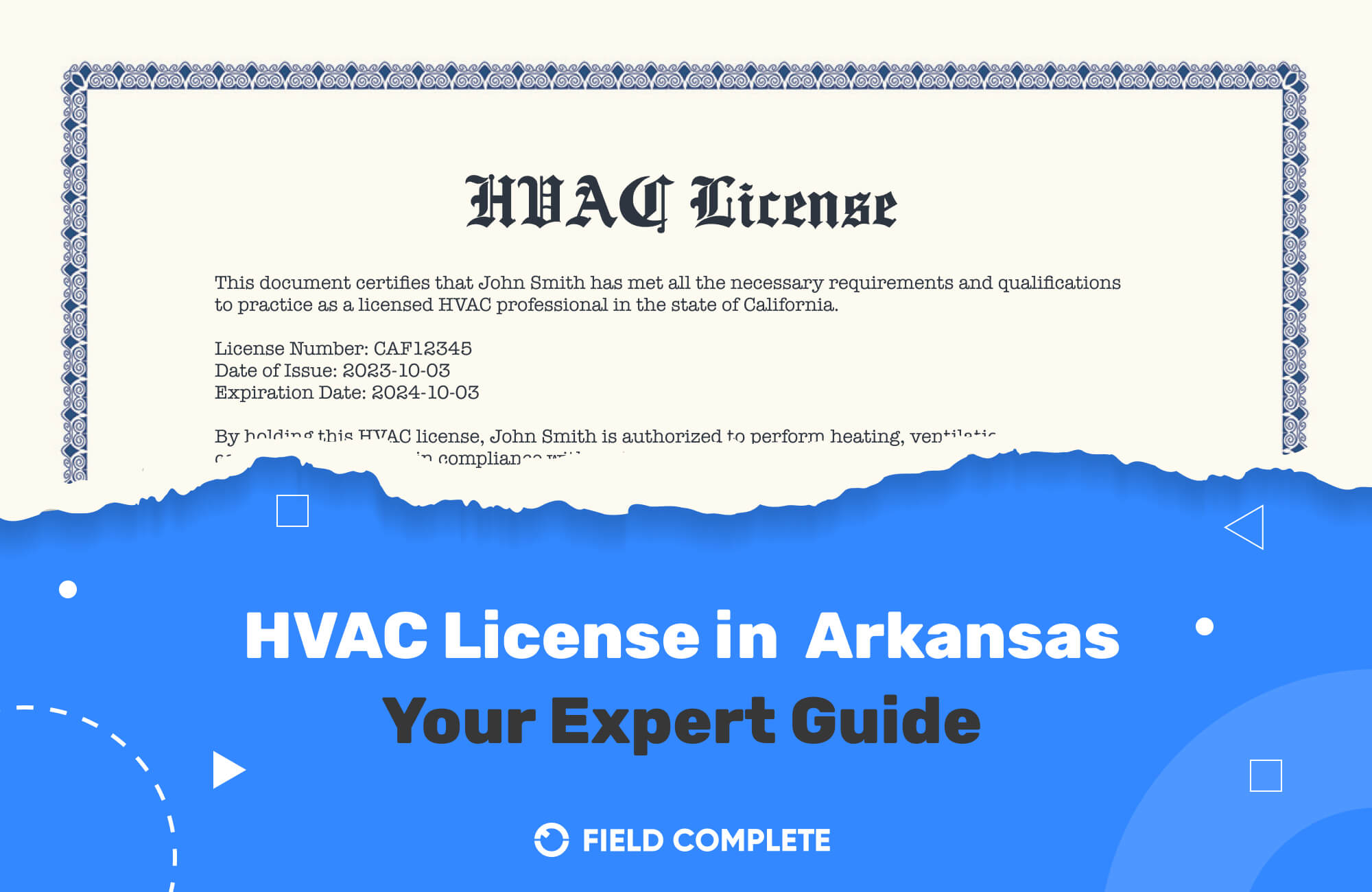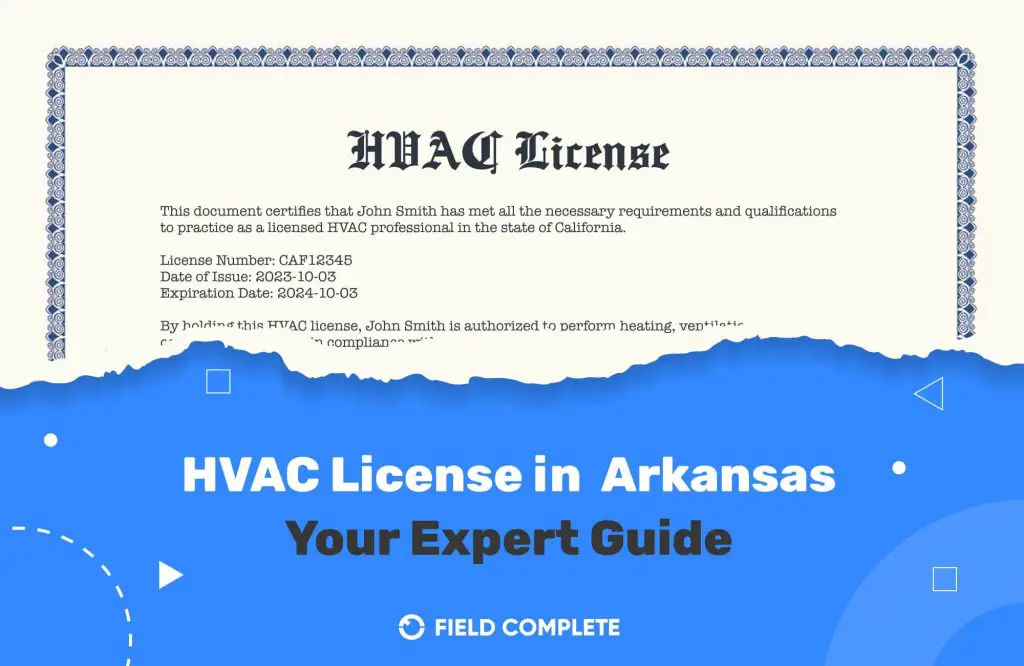It typically takes between six months and two years to get your HVAC certification. Getting your HVAC certification in Austin, Texas, involves meeting experience requirements, passing an exam, and showing proof of insurance certified by the Texas Department of Licensing and Regulation (TDLR).
Before taking the HVAC contractor’s exam, you need four years of work experience with a TDLR-licensed contractor. Completion of the program can range from six months to two years, including classroom time and field experience. Accredited vocational colleges offer programs that can be completed in less than a year to provide certification in HVAC.
The process requires dedication and commitment to meeting the necessary requirements for successful certification.

Credit: fieldcomplete.com
Understanding Hvac Certification
HVAC certification is essential for individuals pursuing a career in heating, ventilation, and air conditioning.
Requirements For Certification
- Complete specified education or training programs.
- Acquire relevant work experience.
- Pass certification exams.
Different Types Of Hvac Certifications
- Journeyman HVAC Certification.
- Master HVAC Certification.
- Refrigerant Handling Certification.
Programs vary based on school and state, with completion times ranging from six months to two years.
The process may include classroom study, hands-on training, and practical experience.
Duration Of Hvac Certification Programs
HVAC certification programs can take between six months to two years depending on the school and state. These programs typically involve a combination of classroom time and hands-on training. Some vocational colleges offer accelerated programs, allowing you to complete your certification in less than a year.
Average Time To Complete Programs
Programs range between six months to two years depending on the institution and state requirements.
Factors Affecting Program Duration
- Education Level: Some programs require a minimum of two years of education.
- Field Experience: Hands-on field experience can impact program duration.
- Institution: School curriculums and course offerings can affect completion time.
Steps To Obtain Hvac Certification
Searching for a career that offers good pay and job stability? Consider becoming a certified HVAC technician. This role involves installing, maintaining, and repairing heating, ventilation, and air conditioning systems, making it a crucial part of the construction and maintenance industry. To start your journey in this field, you’ll need to obtain HVAC certification. Here’s a guide to the steps involved:
Educational Prerequisites
Before pursuing HVAC certification, it’s essential to meet the educational prerequisites. While the minimum required education is typically two years, some programs may extend up to three years. These programs may include a blend of classroom learning and hands-on field experience.
Examination And Licensing Process
After completing the educational requirements, the next step is to undertake the examination and licensing process. The process entails passing an exam set by the relevant regulatory body. Once the exam is successfully cleared, candidates must obtain a license from the respective licensing authority, which may also involve fulfilling practical experience and insurance requirements.
These are the critical steps to become a certified HVAC technician. While the timeline for completing these steps can vary, the overall duration ranges between six months to two years. Embarking on this career path not only offers a promising and stable profession but also paves the way for continuous professional development and growth in the construction and maintenance industry.

Credit: fieldcomplete.com
Comparing Certification Options In Different States
When it comes to pursuing a career in HVAC, one of the first steps is obtaining the necessary certification. However, the process and requirements for obtaining an HVAC certification can vary from state to state.
Variations In Program Length
When comparing HVAC certification programs in different states, one significant factor to consider is the variation in program length. The duration of HVAC programs can range from as short as six months to as long as two years. This variation depends on factors such as the intensity of the program, the depth of the curriculum, and whether it includes hands-on training.
For example, some states may offer accelerated programs that condense the curriculum into a shorter timeframe. These programs often have rigorous schedules and require full-time commitment from students. On the other hand, some states may have longer programs that allow for a more comprehensive learning experience with additional opportunities for practical training.
State-specific Licensing Requirements
Another aspect to consider when comparing HVAC certification options in different states is the state-specific licensing requirements. Each state has its own set of regulations and prerequisites for obtaining an HVAC certification.
These requirements typically include a combination of education, experience, and passing an examination. In some states, candidates may need to complete a specific number of apprenticeship hours or work under a licensed HVAC contractor to meet the experience criteria. Additionally, certain states may have additional licensing options specific to different roles within the HVAC industry, such as technicians or contractors.
For instance, in Texas, aspiring HVAC contractors must be certified by the Texas Department of Licensing and Regulation (TDLR). They need to meet experience requirements, pass an exam, and provide proof of insurance. There are also separate licensing options for HVAC technicians with different sets of requirements.
Understanding these state-specific licensing requirements is crucial for individuals considering pursuing an HVAC certification. It ensures that they are aware of the necessary steps they need to take and the specific criteria they must meet in order to obtain their certification in a particular state.
Benefits Of Obtaining Hvac Certification
Obtaining HVAC certification offers numerous advantages, including increased job opportunities, higher earning potential, and professional credibility. The duration to acquire your HVAC certification typically ranges between six months to two years, depending on the program and state requirements. Completing this certification can pave the way for a rewarding career in the HVAC industry.
Career Advancement Opportunities
Obtaining HVAC certification opens the doors to numerous career advancement opportunities in the heating, ventilation, and air conditioning industry. With the rapid growth of the HVAC field, certified professionals are in high demand. These certifications provide you with the necessary knowledge and skills to take on more challenging roles and responsibilities within the industry. Whether you want to become a project manager, start your own HVAC business, or specialize in a specific area such as energy efficiency or commercial HVAC systems, having a certification will give you a competitive edge in the job market.
Enhanced Earning Potential
HVAC certification also comes with the perk of enhanced earning potential. Certified HVAC technicians typically earn higher wages compared to their non-certified counterparts. This can be attributed to the specialized knowledge and skills that certification provides, making you more valuable to employers. Additionally, as you gain more experience and expertise in the field, your earning potential increases even further. With the growing demand for HVAC services and the need for skilled professionals, certified technicians can negotiate higher salaries and enjoy greater job security.

Credit: fieldcomplete.com
Frequently Asked Questions On How Long Does It Take To Get Your Hvac Certification
How Much Does Hvac License Cost In Texas?
In Texas, an HVAC license costs around $115 and requires certification from the Texas Department of Licensing and Regulation (TDLR). Candidates need experience, pass an exam, and show proof of insurance.
How Do I Get My Hvac Certification In Texas?
To get your HVAC certification in Texas, you must be certified by the Texas Department of Licensing and Regulation (TDLR), meet experience requirements, pass an exam, and have insurance. Other licensing options apply for HVAC technicians.
How Fast Can I Get An Hvac License In Texas?
To get your HVAC license in Texas, you must meet experience requirements, pass an exam, and show proof of insurance. The process typically takes a minimum of four years to qualify for the exam.
How Much Does Hvac Techs Make In Texas?
HVAC techs in Texas typically make an average salary of $48,000 per year.
Conclusion
The timeline to obtain your HVAC certification can vary. Programs may take between six months to two years, while some vocational colleges offer programs that can be completed in less than a year. Ultimately, the duration for acquiring certification depends on the individual’s chosen educational path and dedication.

